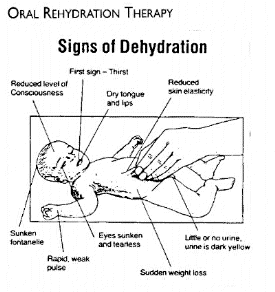|
|
|
|

|
 |
 |
 |
Oral Re-hydration Therapy |
 |
In the developing world, the biggest single killer of young children is diarrhoea - or to be more accurate - dehydration caused by diarrhoea. About three and a half million children under the age of five die and many more are severely weakened by the malnutrition which so often results. The main causes of diarrhoea are poor hygiene and lack of clean drinking water, although specific diseases, such as cholera and measles also cause diarrhoea. A typical child in a poor community in a poor country will have anything from 6 to 16 bouts of diarrhoea each year, each one of which further weakens the child as he or she becomes more and more malnourished. Diarrhoea takes away the appetite, reduces the absorption of food, drains away fluids and nutrients and so causes malnutrition. If this continues, dehydration sets in and death can occur. |
|
|
Until quite recently, diarrhoea could only be treated by qualified health workers using expensive intravenous feeding in a usually inaccessible hospital. This is clearly beyond the reach of most families. Even today, a cure for diarrhoea, or a drug which would stop the disease safely and effectively within a few hours - does not exist. But even so, the deaths of two and a half million children could be prevented by a method which is cheap, safe and so simple it can be learned and used by any parent. A Simple Solution This treatment is oral re-hydration therapy (ort). It consists
of giving, by mouth, a solution to replace the water and salts
lost. Diarrhoea weakens the ability of the body to absorb salts
and water. However, when water is mixed with salt and glucose
in the correct Oral re-hydration therapy can be made up from either specially prepared sachets which can be obtained from health centres and pharmacies, or from ingredients available in the home. Home-made oral re-hydration therapy can be made from sugar (or starch), salt and water which most families can afford. In China, for example, a traditional recipe for oral re-hydration therapy is made from left over rice water. |
||